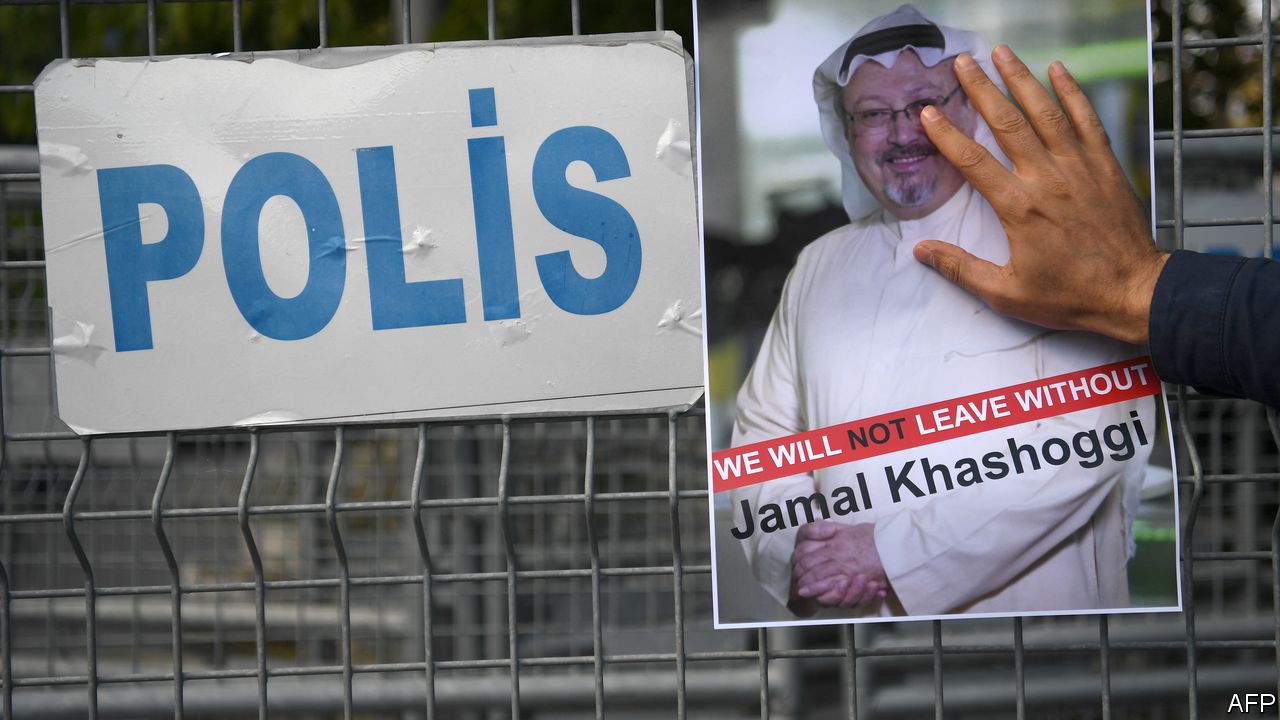
FOR five days friends and colleagues have wondered what became of Jamal Khashoggi, a prominent Saudi journalist living in self-imposed exile. On October 2nd he visited the Saudi consulate in Istanbul to collect some paperwork. Feeling unsafe, he asked his fiancée to wait outside and to call a member of Turkey’s ruling party if he did not emerge. No one has seen him since. Acquaintances feared he had been detained inside or abducted and flown back to Saudi Arabia against his will.
Over the weekend Turkish police made a far grimmer claim: that Mr Khashoggi was murdered inside the consulate by men flown in from Saudi Arabia. His body was smuggled out, they added, perhaps in a diplomatic car. The Saudis call this a “baseless allegation” and insist he left the mission safely. Neither side has offered evidence. Then the Turkish president, Recep Tayyip Erdogan, added to the confusion, saying he still hoped for a positive outcome. Turkish investigators are working to piece together what happened outside the consulate. What happened inside remains a mystery. (Conveniently, the Saudis say the consulate’s CCTV cameras do not record footage.)
It is no mystery why Saudi Arabia might have wanted to silence Mr Khashoggi, a critic of the powerful crown prince, Muhammad bin Salman. He wrote frequently in Arabic, penned a regular column for the Washington Post, and kept close ties with countless diplomats and journalists. For over a year he used that platform to criticise growing repression in Saudi Arabia and urge an end to the war in Yemen. But he was hardly a radical. Mr Khashoggi was part of the Saudi elite, close to members of the royal family. In the 2000s he advised Turki al-Faisal, a former spy chief who became Saudi Arabia’s ambassador to Britain and America. He often stressed that his criticism was nasiha, friendly counsel, and not a rejection of the monarchy.
His disappearance was widely covered because of his connections, but it was not unusual. The crown prince detained more than 100 royals and ministers in a corruption sweep last year. Dozens of activists languish in jail; some may face the death penalty. Astonishingly the Saudis detained a sitting prime minister, Saad Hariri of Lebanon, for two weeks in November. Even spiriting Mr Khashoggi out of Turkey would have had precedent. In March a women’s-rights activist, Loujain al-Hathloul, was detained in Abu Dhabi and whisked back to Saudi Arabia, where she remains in jail.
But murdering a critic abroad would be a chilling escalation, a tactic previously used by despots like Saddam Hussein and Muammar Qaddafi, who used their embassies in London to terrorise exiles. If the allegations are true, it is an unmistakable, brutal message to Saudi dissidents: the state can reach you anywhere. Other Arabs have heard it, too. One Syrian activist in Europe says he’s scrapped a planned trip to his own embassy.
Mr Erdogan was already on bad terms with Saudi Arabia, partly over his support for Qatar in its dispute with its Gulf neighbours. The authoritarian Mr Erdogan is also the world’s leading jailer of journalists. Saudi apologists are already using those facts to discredit any Turkish investigation. Prince Muhammad may not care much about a demarche from Mr Erdogan.
Other reactions will matter more. If the crown prince abducted or killed a critic in Istanbul, business leaders may wish to reconsider attending a major investment conference in Riyadh later this month. In America, where Mr Khashoggi was a resident, a few members of Congress have expressed outrage. “If this is true… it should represent a fundamental break in our relationship,” says Chris Murphy, a Democratic senator. Donald Trump may be less bothered. He is close to the Saudis, bitterly feuding with Turkey, and not exactly a champion of human rights or press freedom. That may explain Mr Erdogan’s ambivalent remarks: he does not wish to confront the kingdom alone.
A final question is how Saudis themselves will react. Prince Muhammad enjoys strong support at home, even though parts of his agenda are going poorly. His economic reforms have met predictable headwinds. His foreign policies range from missteps, like the blockade of Qatar, to catastrophes, like the war in Yemen. But his cultural reforms—granting women the right to drive, allowing cinemas and concerts—are broadly popular, and there are few independent voices left to criticise him. In a recent conversation Mr Khashoggi lamented the cult of personality surrounding the crown prince. “The media is not allowed to debate problems, because that would be a sign of weakness,” he said. Now he himself has become another problem to be hidden from view.








